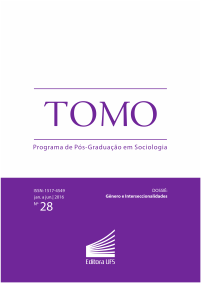Mulheres, Imigrantes e Acadêmicas: Teorias da Interseccionalidade para Pensar a Mobilidade Científica
DOI:
https://doi.org/10.21669/tomo.v0i0.5432Abstract
Pode-se definir a mobilidade científica como o deslocamento geográfico de curta ou larga duração de acadêmicos/as ecientistas por instituições internacionais como objetivo de desempenhar atividade de pesquisa ou docência,inserido em algum programa formalou realizado de maneira independente. A partir de uma análise crítica do fenômeno é possível questionar as dinâmicas de poder que afetam de maneira desigual alguns grupos. Como escopo de contribuir para a democratização da ciência, esteartigo, pautado nas teorias da interseccionalidade, questiona como marcadores de diferenças (gênero, raça e classe) moldama experiência de acadêmicas e cientistas mulheres. Metodologicamente, recorre a uma análise aprofundada da narrativa de duas acadêmicas não portuguesas que realizam suas atividades em Portugal.Downloads
Downloads
Published
How to Cite
Issue
Section
License
TOMO journal adopts the Creative Commons CC-BY 4.0 license which allows:
• Share: copy and redistribute the material in any medium or format.
• Adapt: remix, transform, and create from the material for any purpose, even commercial.
Authors who publish in this journal agree to the following terms:
a) Authors retain copyright and grant the journal the right of first publication, with the work simultaneously licensed under the Creative Commons which allows sharing the work with acknowledgment of authorship and initial publication in this journal.
b) Authors are authorized to assume additional contracts separately, for non-exclusive distribution of the version of the work published in this journal (eg, publishing in an institutional repository or as a book chapter), with acknowledgment of authorship and initial publication in this journal.
c) Authors are allowed and encouraged to publish and distribute their work online (e.g., in institutional repositories or on their personal page) at any point before or during the editorial process, as this can generate productive changes, as well as increase the impact and citation of the published work (O Efeito do Acesso Livre).







 The manuscripts from thsi journals are licenced by CC BY.4.0.
The manuscripts from thsi journals are licenced by CC BY.4.0. 